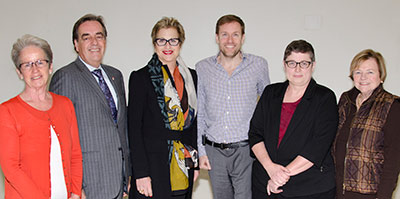And the winner is...
The McGill University Health Centre (MUHC) granted $150,000 to fund a creative new project to improve radiotherapy patients’ experience during the 2014 Challenge Q+ award ceremony yesterday afternoon. The primary goal with this initiative is to provide radiotherapy patients with realistic expectations and explanations regarding the time they will wait for the provision of care in the Department of Radiation Oncology at the MUHC.

Dr. Carolyn Freeman, Normand Rinfret, Gwen Nacos, Dr. Tarek Hijal, Prof. Laurie Hendron, Valerie Shannon
“In our department, we provide approximately 3,500 patient consultations, 10,000 follow-up appointments and 40,000 scheduled radiotherapy treatment sessions per year,” said project co-lead Dr. Tarek Hijal, an MUHC radiation oncologist. “Personalized, realistic waiting times will allow these patients to plan their daily lives and work schedules with confidence, measurably reduce the time they spend in the waiting room, and reduce the anxiety associated with uncertain waiting times for radiotherapy. Explanations will help put our patients at ease and reassure them through this trying period.”
The fact is concern for wait times is a well-known determinant of overall patient satisfaction in radiotherapy but the effect of waiting time uncertainty is often overlooked. It is also a source of stress for staff who must juggle schedules and field inquiries from concerned patients/relatives without confidence in the answers they provide.
According to Normand Rinfret, MUHC director general and CEO, one of the biggest challenges in health care today is with managing expectations. “This project will help do this—we are empowering the patient with knowledge.”
The winning team spans three important domains of expertise: Dr. John Kildea from Medical Physics, Dr. Tarek Hijal from Radiation Oncology, and Professor Laurie Hendren from McGill’s School of Computer Science, who recently went through a course of radiation treatments.
According to patient representative and one of the selection committee members for the award, Lisa Rosati-White, the committee liked that the project was so patient focussed. “The project team received majority support because they were so patient engaged—but I have to say it was a tough choice as there were so many excellent projects to choose from. Unfortunately, we can only choose one.”
Valerie Shannon, who is chair of the Montreal General Hospital Corporation, which was instrumental in the creation of the Q+ Challenge, and chair of the selection committee, as well as a former MUHC director of Nursing, said the selection committee put a clear focus on quality improvement, with a measurable aim at the one-year mark and long-term transferability to other areas in the organization.
One of the main objectives of this award is to promote, support and reward a culture of quality. “A growing body of evidence shows that partnering with patients and inter-professional collaboration on quality initiatives improve the experience of patients and their families as well as outcomes.” says Patricia Lefebvre, MUHC director of Quality, Patient Safety and Performance. “That's why encouraging and sustaining collaborative excellence in quality at the MUHC is a priority.”
Finally, Gwen Nacos, who represents the MUHC Board of Directors and is Chair of the MUHC Committee on Quality and Risk, concluded, “Our patients deserve to focus their attention on their health, while the families need to know their loved ones are being taken care of in the very best way possible.”
Thanks goes to the selection committee their invaluable time and expertise provided to the selection process:
Vincenzo Ciampoi, Gwen Nacos, Lisa Roasati-White, Sophie Baillargeon, Christos Calaritis, Brenda Levine, Patty O’Connor, Marie-Claire Richer and Patricia Lefebvre
-Thank you for all of your invaluable time you spent and for your expertise in the selection process
